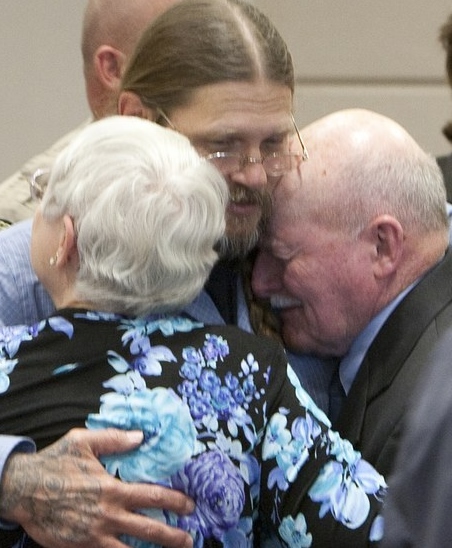 Photo courtesy The Innocence Project On the morning of Jun 4, 1994, the body of 19-year-old Jacie Taylor was found in the bathtub of her apartment in Palisade, Colorado. She had been beaten, raped and strangled with a dog leash.
Her fingernails were broken and investigators discovered semen on a blanket on her couch. Pieces of soap were found in her vagina.
The investigation focused on 33-year-old Robert “Rider” Dewey, a motorcycle buff and recent arrival in town who was staying with a man who knew Taylor’s roommate. Dewey, who had prior convictions for armed robbery and possession of a weapon by a felon, denied involvement in the crime, but in April 1995 he was charged with rape and murder.
At trial in Mesa County, a witness testified that Dewey was not at the apartment where he was staying during the late night of June 3 and early morning hours of June 4, when authorities believed Taylor was murdered.
Another witness testified that Dewey had commented on details of the murder, including that Taylor was strangled with a dog leash, before that information had been reported.
Other witnesses testified that Dewey had scratch marks on his face the morning after the murder and that the victim, who had met Dewey prior to the crime, had said she was afraid of him.
Police testified that Dewey had made inconsistent statements about the source of scratches on his arm and tried to avoid police. Dewey was wanted on a warrant for stealing a gun, so he hid in a closet when police were investigating the case and lied about his name when questioned. He admitted he had been in Taylor’s apartment, but denied involvement in the crime.
Further, police said he left town after being interviewed.
Although tests on the semen showed it was not Dewey’s, authorities believed that meant that Dewey and someone else committed the crime. Tests performed on a shirt recovered from his belongings showed the presence of blood and determined that it could have come from Taylor or Dewey—or about 45 percent of the Caucasian population.
Dewey was convicted in 1996 and sentenced to life in prison.
Having lost his appeals, Dewey and his attorney, Danyel Joffe, approached the New York-based Innocence Project in 2007 to seek further DNA testing of the blood on the shirt.
The testing was completed in 2010 and in January 2011, Joffe approached the Colorado Attorney General’s Office, which had received a $1.2 million federal grant to fund the DNA Justice Review Project. The review project, a joint effort of the attorney general, the Colorado Bureau of Investigation and the Denver County District Attorney’s Office, seeks to identify wrongfully convicted inmates who can be exonerated by DNA.
Julie Selsberg, a senior assistant attorney general who heads the review project, obtained the lab reports, which showed the blood on the shirt was Dewey’s, not Taylor’s. Further, DNA tests performed on the fingernail scrapings, pieces of soap, and leash generated partial DNA profiles that matched each other and the profile from the semen stain on the blanket. The single male DNA profile from the blanket was submitted to the FBI’s national DNA database (CODIS).
The profile matched that of Douglas Thames Jr., a convicted felon in prison for a rape and murder committed in 1989—five years before Taylor was killed.
Thames was convicted in 1996 of the rape and murder of Susan Doll in 1989 in Fort Collins. At the time of that crime, Thames was 16 years old. The case went unsolved until late summer of 1995 when several pairs of women’s underwear were found hidden in a home in Fort Collins where Thames had once lived.
Ten days before Doll was murdered, someone broke into her home and stole two dozen pairs of her underwear. Authorities were able to link the underwear to Doll and DNA tests on evidence at the Doll murder were linked to Thames.
Dewey already was charged with Taylor’s rape and murder by the time Thames was arrested for the rape and murder of Doll.
Investigators later learned that Thames was staying within a block of Taylor’s apartment on the night she was murdered.
Mesa County Assistant District Attorney Rich Tuttle conducted an extensive investigation and as a result, on April 30, 2012, Tuttle joined with Dewey’s lawyers in asking that the conviction be vacated. The motion was granted, the charges were dismissed, and Dewey was released. In September 2013, a judge approved $1.2 million in state compensation to Dewey.
On the same day, Thames was charged with Taylor's murder. A Mesa County jury convicted Thames of the murder in November 2015 and he was sentenced to life in prison without parole.
– Maurice Possley
|